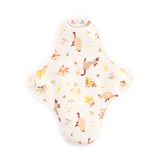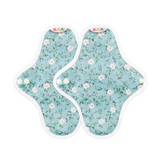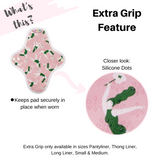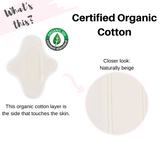









Hannahpad Small Pad 21cm/25mL (2 Pack)
Ideal for light spotting days, vaginal discharge between cycles or as a menstrual cup backup. Comes as a 2-pack.
Deciding between Pantyliner and Small? The main difference is absorbency – Pantyliner has 2 internal layers, while Small has 4 layers for extra absorbency.
- Length: 21cm / Absorbency: 25mL
- Certified organic cotton absorbent layers
- Medical grade TPU waterproof coating
- Unbleached and undyed – zero toxins on your skin!
- Slim design with snap buttons to hold in place
- Silicone dots with flower motif add extra grip
PLEASE NOTE- we stock a variety of fun patterns so your Hannahpad may vary from the web image

As if knowing your bra size wasn’t enough, now you have to know your vagina size?
Don’t panic, that’s why we’re here. Although you’d be well off with either menstrual cup size, we want to make sure you’re comfortable with your choice.
That’s why we offer two sizes (because not all vaginas are the same).

The Lunette Cup Model 1
Light to normal flow
All Lunette menstrual cups are soft and pliable, however, Lunette Cup Model 1 is made of softer silicone than Lunette Cup Model 2.
- The diameter is 41 mm (1.6 inches) by 47 mm (1.9 inches).
- The stem measures 25 mm (1 inch).
- The volume of the cup is 25 ml (0.85 fl oz).
- Measuring lines: 5ml (0.17 oz) and 13.5ml (0.46 oz).
The Lunette Cup Model 2
Normal to heavy flow
All Lunette menstrual cups are soft and pliable, however, Lunette Cup Model 2 is made of firmer silicone than Lunette Cup Model 1.
- The diameter is 46 mm (1.8 inches) by 52 mm (2 inches).
- The stem measures 20 mm (0.8 inches).
- The volume of the cup is 30 ml (1.0 fl oz).
- Measuring lines: 7.5ml (0.25 oz) and 15ml (0.5 oz)
Menstrual Cup Sizes - The Cup Size Guide For Your Body and Flow
Lunette is emptied about 2-4 times a day, and can be used overnight for up to 12 hours.
You will quickly learn your own rhythm by viewing how much fluid your cup has gathered. The measuring lines outside of the cup help to monitor your flow.
Flow
Lighter flow? Model 1 might be for you. Heavier flow? Give model 2 a go!
Age
For teens and young users, the smaller model 1 makes for easier ins and outs.
Pregnancy
For our Mums out there, you can use both sizes. Pregnancy changes a few things down there, so firstly take into account your new cervix position (if it's low use a model 1), and secondly your new flow volume post-birth.
Cervix
If you have a low-sitting cervix, try the shorter model 1 for a better fit.
Lifestyle
If you're a fitness goddess with strong vaginal muscles, consider using Model 1.
Bladder
Sensitive bladder? The softer model 1 might be a match made in heaven for you.
FAQs
How do I know if my flow is heavy or light?
The dividing line between normal and heavy flow is 80 ml during your periods.
Lunette model 1:
Spotting: A drop or two of blood, not even requiring a sanitary pad though you may prefer to use one.
Very light bleeding: Needing to change a low-absorbency tampon or pad one or two times per day, though you may prefer to change them more frequently.
Light bleeding: Needing to change a low or regular absorbency tampon or pad two or three times per day, though you may prefer to change more frequently.
Lunette model 2:
Moderate bleeding: Changing normal absorbency pad or tampon every three to four hours.
Heavy bleeding: Needing to change a high-absorbency tampon or pad every three to four hours, though you may prefer to change more frequently.
Very heavy bleeding or Gushing:
Protection hardly works at all. You would need to change the highest absorbency tampon or pad every hour or two.
How does the menstrual cup differ from the tampon?
Both are internal menstrual protection. A menstrual cup collects the blood and the tampon absorbs it. A tampon can be used only once whereas a menstrual cup can be used for many years.
The absorbing capacity of a tampon is given in grammes and the capacity of the menstrual cup in millilitres. One ml of menstrual blood is comparable with a gramme, so the capacity of tampons and menstrual cups are comparable. The capacity of the Lunette menstrual cup is 25 ml (model 1) and 30 ml (model 2). The absorbing capacity of a tampon is 6-18 g.

At home, at work, on the go! Lunette menstrual cups are designed to be simple and fuss-free period cups. Simply fold and insert. Done!
Use the guide below to learn how to insert a menstrual cup and you’ll be a period ninja in no time.

1. Wash hands
Check that the air holes at the top of your cup are open. Wash your hands.
Wash your Lunette menstrual cup with Feelbetter Cup Cleanser and rinse it carefully.
2. Fold + Hold
Get comfy: you can insert the cup while sitting, standing or squatting. Spreading your legs will help with a successful and comfortable insertion. Relax.
Fold the cup in on itself to make flat, then in half to form a C shape.
3. Insert
Keep it rolled up and guide it rim first into the vagina. To check that the cup has fully opened, slide a clean finger up to the cup bottom and feel it - it should be round. Lunette can be used any time in your menstrual cycle, from heavy to light flow days.
4. Wear + learn
Lunette is emptied about 2–4 times a day, can be used for up to 12 hours, also overnight. The measuring lines on the cup help monitor your flow and easily learn your rhythm.
5. Remove + empty
Wash your hands and relax your muscles. Grasp the bottom of the cup. To break seal, squeeze the bottom of the cup.
Be sure not to pull it out by holding the stem alone. Tip contents into the toilet. Rinse & Reuse.
6. Clean + sanitize
Lunette should be cleaned before and after your cycle, and after emptying. To avoid odor and discoloration, rinse first in cold water, and then wash with hot water and Lunette Feelbetter Cup Cleanser designed for silicone cups.
How does the menstrual cup work?
The Lunette menstrual cup fits nice and snug, held in position by the seal formed by the walls of the vagina and the vaginal muscles. Your interior is superior and does all the work — you’ll barely feel a thing!
The cup is placed entirely inside the lower part of the vagina, just behind the pubic bone below the cervix.
Vaginas are tilted backwards, so guiding the cup towards the small of your back, moving it up and down will help you find the correct and comfortable position.
Rotate the cup to check that it has fully opened and doesn’t leak. Your cervix may move during menstruation, so inserting the cup requires practice and knowledge of your own anatomy.
Tips for first time menstrual cup insertion
Relax and take your time: Choose alone time when you can focus without distractions or interruptions. Perhaps after a warm bath when you are relaxed. If you are too nervous, the vaginal muscles will tighten, making it uncomfortable, if not impossible, for successful insertion.
Get Acquainted with yourself: It is always a good idea to know your own body. Take some time to locate the vaginal opening and even insert a finger to locate your cervix. It feels exactly like the tip of your nose. Knowing where your cervix is will help you to position the cup properly and not insert it too high.
Practice during your period: The vagina is more flexible and the blood works as a lubricant. OR . . .
Take a "dry run" before your period: You might be more comfortable practicing before your period if you feel squeamish about touching blood. In this case, use water as a lubricant.
Try different folds that accentuate the insertion poin: Most use the typical C-fold. However, there are many ways to fold a Lunette. Check out the most common different folds that you can use with your period cup.
Proper insertion direction: Be aware that the direction of insertion needs to be aimed towards the small of your back -- not straight up.
Be patient: Know that it may take several times before you are successful. If you begin without the expectation of perfect insertion, you are more likely to be relaxed and pleasantly surprised when success happens.
Assess the stem: Once inserted, you will need to decide whether or not to keep the stem. If it protrudes, it will be uncomfortable. In this case, you likely won't need the stem and can trim it off. However, if not, you may need it to assist with removal.
Tips for first time menstrual cup removal
Again - RELAX: Just as with insertion. Take your time!
Do NOT pull on the stem: The stem is used to gain access the bottom of the cup. If you pull on the stem, it will hurt! It will also create a mess since the cup won't be supported or controlled when it exits.
Squeeze bottom to release suction: This is the key - the bottom of the cup has ridges for gripping. Grip the bottom and tweak the cup to the side. The idea is to pull an edge away from the vaginal wall to release suction. You will hear it when this happens.
Rock gently: Once suction releases, gently rock the cup from side to side as you pull it out. This technique might not be necessary, but helps with removal if the cup is feeling stubborn to come out.








